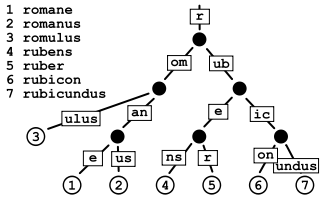OpenJAX CodeGen RadixTree generates a Radix Tree of keywords as a Java Enum for time-optimized lookup operations.
This module takes a list of keywords as an input, and produces a Java Enum that allows incremental, optimized lookup operations.
With the generated Enum, a program can thereafter perform lookups for matching keywords, character by character. Each next character narrows the search space of the matching enums by stepping deeper into the radix tree.

Lookup operations are performed incrementally. Each next character narrows the search space of the matching enums by stepping deeper into the radix tree. At each character input, a binary search is performed for the terms that have been narrowed by the previous character. Each Radix Tree Enum therefore has different specific performance, because it is based on the chosen keywords.
Let: nᵢ = average number of keyword nodes at depth 𝖎
Let: 𝖗 = average number of keyword characters (i.e. average depth of the radix tree)
The first character lookup performs in O(log n₀) time, where n₀ is the number of children of the node matched from the 1st character.
The next character lookup performs in O(log n₁) time, where n₁ is the number of children of the node matched from the 2nd character.
The next character lookup performs in O(log n₂) time, where n₂ is the number of children of the node matched from the 3rd character.
The next character lookup performs in O(log n₃) time, and so on...
For large lists of keywords, each character lookup after the first is performed in O(log nᵣ₊₁) time. Each next lookup reduces with the subsequent lookup by the square, on average. As 𝖎 approaches 𝖗, Big-O complexity approaches constant time. The performance of whole-word lookups for large lists can be expressed as:
ᵣ
O(log n₀) + O(log n₁) + O(log n₂) + ... + O(log nᵣ) = ∑ O(log nᵢ)
ⁱ⁼⁰
We can infer that:
O(log n₀) > O(log n₁) > O(log n₂) > ... > O(log nᵣ)
Which allows us to estimate:
ᵣ
∑ O(log nᵢ) < 𝖗 * O(log n₀)
ⁱ⁼⁰
Since 𝖗 is a constant, it can be removed.
ᵣ
∑ O(log nᵢ) ≈ O(log n₀)
ⁱ⁼⁰
For small lists of keywords, the same rules apply as for large lists. For small lists, however, Big-O complexity approaches constant time even faster, resulting in the same estimate:
O(log n₀)
Suppose you want to create a RadixTreeEnum from the keywords in the illustration above.
String className = "Keyword";
File outFile = new File(className + ".java");
String[] keywords = new String[] {"romane", "romanus", "romulus", "rubens", "ruber", "rubicon", "rubicundus"};
RadixTreeEnumGenerator.generate(className, outFile, keywords);The RadixTreeEnumGenerator.generate(...) method will build the RadixTreeEnum, and will write it to Keyword.java.
Suppose you want to look up the Keyword matching the string "rubens":
String string = "rubens";
Keyword word = null;
for (int i = 0; i < string.length(); ++i) { // [N]
char ch = string.charAt(i);
word = Keyword.findNext(word, i, ch);
System.out.println(ch + ": " + word);
if (word == null)
break; // The tree does not contain the string
}This code shows how the generated Keyword enum can be used to perform lookups for matching values, character-by-character. The output of this code will be:
r: rubens
u: rubens
b: ruber
e: ruber
n: rubens
s: rubens
The output shows that Keyword.RUBENS was in fact matched from the first character lookup, which supports the O(log n₀) performance estimate.
The codegen-maven-plugin can be used to generate RadixTree enums during the build lifecycle, in a phase such as generate-sources.
Pull requests are welcome. For major changes, please open an issue first to discuss what you would like to change.
Please make sure to update tests as appropriate.
This project is licensed under the MIT License - see the LICENSE.txt file for details.

